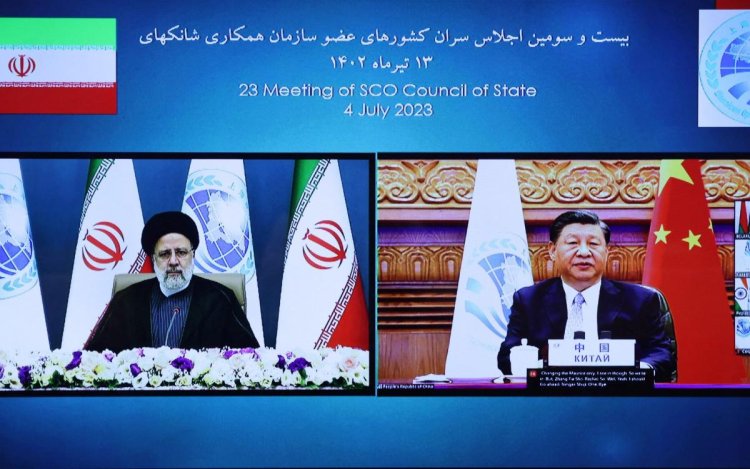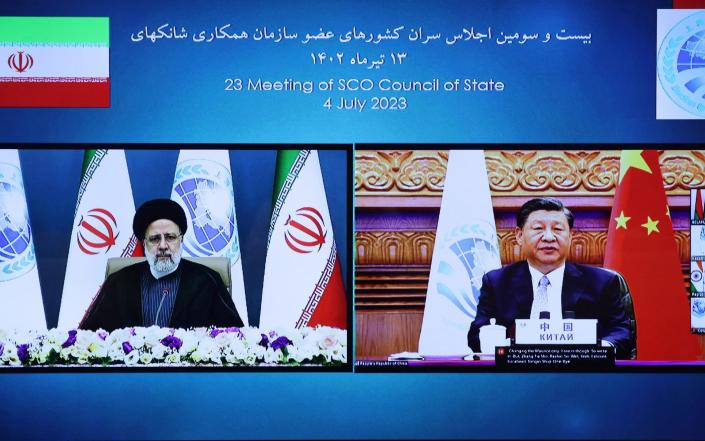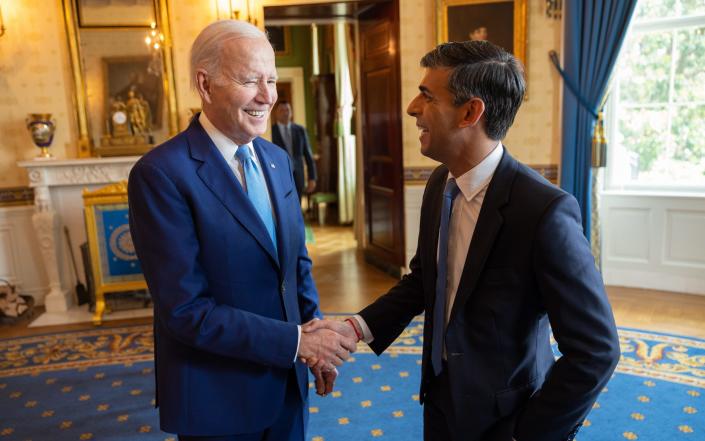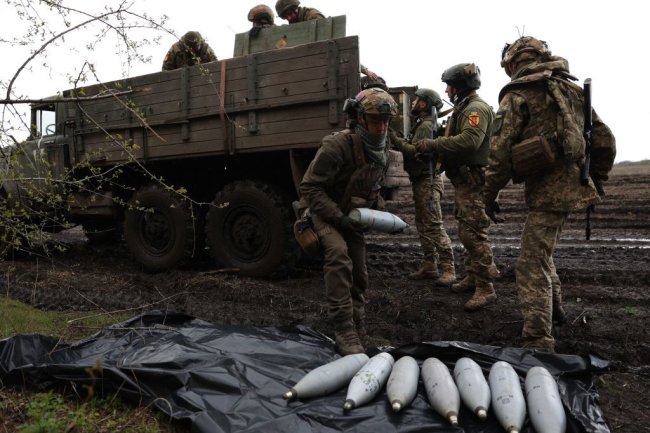The West needs a smarter China strategy to dissuade it from invading Taiwan
Iran joined the Shanghai Cooperation Organisation, established by China and Russia, as its newest member this week - WANA NEWS AGENCY/REUTERSThe Shanghai Cooperation Organisation (SCO), established by China and Russia, this week welcomed Iran as its newest member, despite it being on the cusp of having enough enriched uranium to make a nuclear weapon.It then invited Belarus to join the club. Meanwhile, Nato members can’t agree on the next Secretary General.Unless the West focuses on its strategic priorities – from supply chains to security cooperation – while broadening its appeal, it won’t sway the war in Ukraine away from Russia, let alone dissuade China from invading Taiwan.The SCO is not just home to geopolitical reprobates.It was chaired this year by India, with the United Nations, the Association of South East Asian Nations (Asean) and strategically important countries like Saudi Arabia all invited.SCO members now represent over 40pc of the world’s population. They coordinate on


The Shanghai Cooperation Organisation (SCO), established by China and Russia, this week welcomed Iran as its newest member, despite it being on the cusp of having enough enriched uranium to make a nuclear weapon.
It then invited Belarus to join the club. Meanwhile, Nato members can’t agree on the next Secretary General.
Unless the West focuses on its strategic priorities – from supply chains to security cooperation – while broadening its appeal, it won’t sway the war in Ukraine away from Russia, let alone dissuade China from invading Taiwan.
The SCO is not just home to geopolitical reprobates.
It was chaired this year by India, with the United Nations, the Association of South East Asian Nations (Asean) and strategically important countries like Saudi Arabia all invited.
SCO members now represent over 40pc of the world’s population. They coordinate on policy from the Caucasus region – rich in oil, gas and minerals like manganese and tungsten used in manufacturing and steel-making – to Afghanistan.
While China’s international reach is growing, Western solidarity looked shaky in Afghanistan and will be tested in Ukraine.
Former US President Donald Trump’s swipe that Nato was “obsolete”, and French President Emmanuel Macron’s complaint that the organisation was “brain dead”, seem distinctly misjudged and a gift to anti-Western states.
We need smarter uses of Western power, not least given it has ebbed over time. At the beginning of the Cold War, Nato countries made up 57pc of global Gross Domestic Product (GDP), and China 6pc.
Today, the figures are 47pc and 18pc – even though Nato membership has doubled.
Yet France vetoed the opening of a Nato office in Tokyo for fear it would eclipse the European Union’s underwhelming diplomatic presence. Nato secretary general Jens Stoltenberg is surely right when he observes that Nato is not going to China, but China is coming to Nato through cyber-attacks, misinformation and other hybrid threats.
China is, however, being forced to face up to its own weaknesses. Forecasts that its GDP would overtake the US by 2030 have been torn up.
China’s working age population has been in decline for years, while youth unemployment in the cities has reached one in five. Meanwhile, a property bust has piled huge debts from local government onto the state.
In truth, this may restrain and rankle China’s leadership, reducing funds available for the naval construction necessary to retake Taiwan, but tempting belligerence with its neighbours to divert from simmering domestic tensions.
As Western allies walk this tightrope, we should focus on five priorities.
First, competitiveness and innovation condition influence and resilience. The UK’s strengths lie in tech, the life sciences, high-end manufacturing and financial services. We must be relentless in pursuing our comparative advantages.
Second, the UK needs to de-risk reliance on China, by expanding our Free Trade Agreements, reinforcing legislative protections of sensitive infrastructure, safeguarding universities from financial coercion, and bolstering our resilience to cyber-attacks.
We also need to be realistic.
Heady talk about wholesale reshoring of manufacturing from China is not sustainable, given relative labour costs. But we can do more to inject ourselves into critical supply chains by, for example, exploiting Cornish lithium deposits needed for electric vehicle batteries.
The UK-US Atlantic Declaration signed by Joe Biden and Rishi Sunak offers a good precedent.
Better still: India has become the 14th member of the Minerals Security Partnership (MSP), a framework for bolstering critical mineral supply chains. It is a game-changing addition to what had previously been a predominantly Western partnership.
The broader the membership, the more it will reinforce economic resilience. And it is not just the big players that matter: quietly, Vietnam is fast becoming an important link in de-risking supply chains away from China.
The lesson from Huawei’s entanglement in our 5G network is that we must build up more “High Trust, High Tech” partnerships with countries including Japan, South Korea, Israel and India.
Such deals should develop commercial technology as well as ensure collaboration against cyber-attacks, misinformation, and perverse uses of AI in the future.
Third, we must collaborate with a wider network of like-minded nations to defend the international rules-based system against Chinese vandalism – from under-priced steel dumped on the world market to China’s bullying of its neighbours in maritime disputes.


The next challenges include setting rules around cyber and artificial intelligence, where China will attract support both from trouble-makers such as Russia and Iran, and (more quietly) other non-aligned countries. This week’s SCO Declaration points in this direction.
Fourth, the UK needs to focus consistently on the Indo-Pacific, home to the growth markets of the future.
Joining the Comprehensive and Progressive Trans-Pacific Partnership (CPTPP) is important in economic and strategic terms. We need to follow up with a Free Trade Agreement with India – a counterweight to China, and an increasingly pivotal voice in international fora.
Fifth, we need broader security cooperation. The UK joining Aukus, the security pact to provide Australia with nuclear-powered submarines, is a start. Next, we should collaborate with the Quad (US, Japan, India, Australia) on maritime and cyber security.
Likewise, the decision in 2021 by Asean to admit the UK as a “dialogue partner” will promote cooperation among China’s nervous neighbours – including Singapore, Malaysia, Vietnam and the Philippines – in areas of common interest.
The SCO declaration affirmed support for China’s Belt and Road initiative, which subjects African and Asian governments to punitive long-term debt in return for infrastructure investment.
On a tour of East Africa in 2021, I asked three heads of government why they accepted such onerous terms from China, which they would have once decried as neo-imperialism from US or European governments. They all gave the same response: make us a better offer.
This is the moment for the West to demonstrate that the combination of its trade, aid, the greater integrity of its businesses and its values are a better bet.
The elephant in the room remains Taiwan.
President Xi Jinping will weigh up the risks versus rewards of trying to reunite the mainland with the renegade province.
Against an increasingly combustible domestic backdrop within China, the West’s ability to expand its reach beyond its natural comfort zone, shore up China’s neighbours and halt the flow of nations towards the SCO is our best bet for positively shifting Beijing’s delicately balanced assessment away from war, and towards more meaningful cooperation.
Dominic Raab is the MP for Esher and Walton, and former Deputy Prime Minister and Foreign Secretary
What's Your Reaction?













